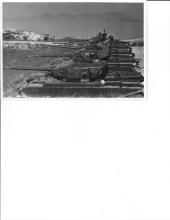9 Dec 1941, Chronology of Events Related to Stanley Civilian Internment Camp
Primary tabs
As British forces withdraw from the northern New Territories to the Gin Drinkers Line, order is already starting to break down on the Mainland.
Edith and Arthur Hamson and their children Mavis and Richard are in a warden's house in Kowloon where they've fled to escape the bombing.
Late in the evening they decide to return home, walking past looters - one 'brazen' pair pushing a grand piano down the street.
They arrive to find that their servants, Ah Moi, Ah Ching and Ah Lee, have just managed to hold off some 'bandits'. Arthur spends an uneasy night constantly having to chase off more would-be looters.
Dr. Isaac Newton, at the Kowloon Hospital, records that yesterday was the 'most hectic 14 hours' of his life. He's sharing a ward with {Dr. J. P.} Fehilly and {the Rev. H. A.} Wittenbach at night, and they have taken over {Dr. K. H.} Uttley's house as a mess by day - Uttley is organising a relief hospital at the Peninsula Hotel.
This afternoon Kowloon hospital is visited by the Director of Medical Services (Selwyn-Selwyn-Clarke) and the Governor (Sir Mark Young). Newton shows them round in the intervals between operating. He finishes the last operation at 10.50 p.m.
Twins Aileen and Doris Woods spend the morning packing and arranging for their pet cats to be destroyed. Then they go to withdraw emergency funds from the Kowloon Branch of the HKSBC in the east wing of the Peninsula Hotel. They try to get a pass to cross to Victoria (now Central): Doris is given one because she's a bank worker, while Aileen is refused because her work isn't regarded as important enough.
On Hong Kong Island Phyllis Harrop is up by 6.30 and the first air raid is 15 minutes later. During the course of the morning's work she discovers that she's now 'attached to the Chinese secret police' - her pre-war work involved close contact with Chinese people, and she speaks the language.
Early in the afternoon she realises that she has had no food since breakfast yesterday apart from a cup of tea in the morning, so she goes home, reaching her flat at about 4 p.m., and has a meal. She's soon in bed, exhausted but unable to sleep.
Joseph Alsop, an American writer working with the Flying Tigers, is trapped in Hong Kong while on a supply mission for the aviators. He's in a bungalow in Kowloon, giving up hope of finding a flight out. He rings up fellow American Emily Hahn, who suggests he works for Selwyn-Clarke. He becomes a stretcher bearer - 'he did good work'.
Hahn herself is one of a number of people living in the Selwyn-Clarke's house in a vulnerable position on the Peak:
The first day was child's play, but the second day we had more than air raids; we had shelling from the approaching Jap forces across the bay and from a few of their ships that had stolen up close to the island. It's probably an idiosyncrasy of mine, but I prefer bombs to shells. I'm more used to them. You can see the plane they are coming from, and you can hear the bomb coming down, and you know where you are...(and) once a bomb has popped, it has popped, and the plane can't stay in one place pegging away at you. Shells are different. Shells keep coming and hitting at the same spot. Shells are the devil.
In the UK the situation makes the front page of today's Daily Express (which of course reports yesterday's events):
‘Hongkong blockaded’
HONGKONG, Monday. — Hongkong had two air raids today. The Japs dropped 1,000 pamphlets and a few bombs in the morning, begging the Chinese to attack us, and a few more bombs in the afternoon, causing some damage and casualties.
The raiders—there were about a dozen—scattered as soon as they were fired on. One is reported to have been shot down over Green Island, off the western entrance to the harbour.
At dawn several hundred Japanese approached the frontier, but found we had already blown up the strategic positions.
A Tokyo broadcast picked up here claimed the destruction of 12 planes on the ground. It was also said that the Japanese Navy was blockading Hongkong.
Sources:
Withdrawal: Tony Banham, Not The Slightest Chance, 2003, 33
Hamsons: Allana Corbin, Prisoners of the East, 2002, 72
Newton: Alan Birch and Martin Cole, Captive Christmas, 1979, 17-18.
Woods: John Luff, The Hidden Years, 1967, 45
Harrop: Phyllis Harrop, Hong Kong Incident, 1943, 68-69
Alsop: Emily Hahn, China To Me, 1986 ed., 280
Hahn: Emily Hahn, China To Me, 1986 ed., 261

